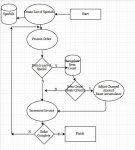Freshman
Registered User.
- Local time
- Today, 21:11
- Joined
- May 21, 2010
- Messages
- 437
Hi all,
I have a tbl called RegTbl with the following fields:
ItemCode
Qty
And then 2 tables used to setup some 'combos'
Combo
ComboItems
I need to find a way to identify when all Items of any of the combos are matched so I can delete the individual items and replace them with the matching ComboCode
I'm ok with marking and deleting the items once I can identify then but I'm battling with the query or a method to check for a possible match.
I've attached an extract of the tables with some queries to help.
I would appreciate some help with this
In my example data Combo4 is made up of item 17 and 86 so if that is matched in the RegTbl then it would mean I need to delete 17 and 86 and replace with Combo4.
Cherry on top would be to handle multiple combos
Thanks
Pierre
I have a tbl called RegTbl with the following fields:
ItemCode
Qty
And then 2 tables used to setup some 'combos'
Combo
ComboItems
I need to find a way to identify when all Items of any of the combos are matched so I can delete the individual items and replace them with the matching ComboCode
I'm ok with marking and deleting the items once I can identify then but I'm battling with the query or a method to check for a possible match.
I've attached an extract of the tables with some queries to help.
I would appreciate some help with this
In my example data Combo4 is made up of item 17 and 86 so if that is matched in the RegTbl then it would mean I need to delete 17 and 86 and replace with Combo4.
Cherry on top would be to handle multiple combos
Thanks
Pierre

